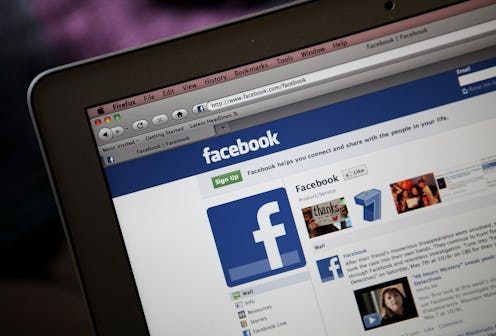News
Facebook To The DEA: Stop Making Fake Profiles
Over a week after the news first broke that the Drug Enforcement Agency created a fake Facebook profile in order to bring a drug ring to justice, the social media giant has finally broken its silence on the concerning practice. On Friday, Facebook made the DEA promise not to make fake profiles anymore regardless of their intentions because it represents a huge violation of Facebook's terms and policies. Because Facebook is the only one who should be allowed to ignore their own privacy policies.
In a strongly worded letter to the DEA, Facebook's Chief Security Officer Joe Sullivan expressed the company's "deep concern about the DEA's conduct" and accused the federal agency of "[undermining] trust in the Facebook community." And despite Facebook's own questionable practices surrounding its user base, the DEA's tactics are clearly unethical, even if their intentions were to catch criminals.
The fake profile the DEA created was not of a fictional personality, but rather that of a real-life woman named Sondra Arquiett, previously known as Sondra Prince. Arquiett was arrested 2010 under accusations of being involved in a large drug ring, and Buzzfeed reports that a judge ultimately determined her to be a "bit player who accepted responsibility," and sentenced her to probation.
But unbeknownst to her, that wasn't the only repercussion to come out of her involvement in the drug ring. DEA Special Agent Timothy Sinnigen also decided to steal Arquiett's identity and create a fake profile page under her name, complete with photos seized from her phone. Some of these photos were of Arquiett in her underwear, and others actually showed images of Arquiett's underage child and niece. After a friend began asking questions about these photos, Arquiett realized that her identity had been stolen by none other than the US government.
After Arquiett sued the agency in 2013, the DEA fired back, defending its techniques as serving a "legitimate law enforcement purpose." But Facebook certainly doesn't agree. No end goal, Facebook believes, justifies the means that the DEA used to achieve those purposes. Sullivan noted that "requiring people to use their real identities on Facebook is 'the primary mechanism we have to protect the millions of people every day, all around the world, from real harm.'"
In response to Facebook's letter, Justice Department spokesman Brian Fallon told the Associated Press, "...to our knowledge, this is not a widespread practice among our federal law enforcement agencies." But this may not be entirely true. Four years ago in 2010, the Associated Press reported that "US law enforcement agents are... going undercover with false online profiles to communicate with suspects and gather private information." A Freedom of Information Act lawsuit managed to obtain internal Department of Justice documents that suggested that agents across various departments were heavily dependent on social media for cracking hard cases. By logging onto Facebook, Twitter or Myspace, these agents were able to do something they could not do in real life — be someone else.
Facebook profiles could be used to do everything from sending messages to suspects, to browsing through pictures, to even checking for potential alibis amongst suspected criminals. With the sheer amount of information shared on Facebook and other social media sites every day, it comes as no surprise that there is a veritable treasure trove of evidence that the DOJ could benefit from.
But whether or not these practices are ethical, or more importantly, legal, is up for debate. Sullivan's letter notes,
More fundamentally, the DEA's actions threaten the integrity of our community. Facebook strives to maintain a safe, trusted environment where people can engage in authentic interactions with the people they know and meet in real life.
This was, after all, one of the key differentiating factors between Facebook and Myspace that allowed the now nearly 1.5 billion person strong social network to surpass its competition. According to Facebook, safety is at the heart of fake profile concerns. Sullivan continued,
Indeed, as we have observed at Facebook, such deceptive actions are often used to further harmful conduct, such as trolling, hate speech, scams, bullying, and even domestic violence. This impact is markedly different from undercover investigations conducted in the "real" world.
Sullivan concludes his letter by saying, "We look forward to your response and confirmation that you have taken all necessary steps to prevent further unauthorized use of Facebook by the DEA and its agents." The DOJ is currently in the midst of a review examining whether or not the fake profile tactics indeed went too far beyond the law.
This case certainly raises new questions about the degree to which Facebook, and companies like it, which have an enormous potential to aid in ongoing investigations, are obligated to assist the government in their legal proceedings. Earlier this year, Facebook was instrumental in catching a child pornographer who himself posed as a 12-year-old in order to convince other children to send him lewd photos and videos. And in 2013, the New York Times reports that the government discussed plans with Google and Facebook to "build separate, secure portals" that would allow them to request and retrieve specific data from the tech companies' servers.
While Facebook's privacy policy is obviously meant to keep its users safe, there may be instances when allowing the government to infiltrate the network would allow law enforcement agents to better perform their legal duties. In today's digital world, just how closely connected are privacy and safety?
Images: Getty Images (4)
